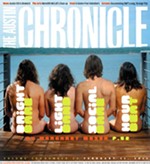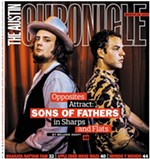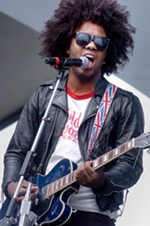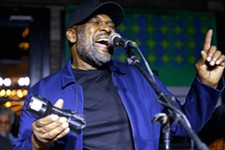The Weapon Is Really a Silent One
The politics of K'Naan
By Thomas Fawcett, 11:34AM, Thu. Oct. 1, 2009
K’Naan stands to gain a whole mess of new fans with his festival performance tomorrow, 5:45pm on the Wildflower Center stage.
With every stop in Austin the Somali-born, Toronto-based wordsmith has turned heads, even bringing grown folks to tears at the NPR showcase during South by Southwest earlier this year. K’Naan fled his native Somalia as the country erupted in civil war in 1991, a conflict that profoundly informs his music.
Sophomore release Troubadour - recorded in the home studio of the late Bob Marley - is K’Naan’s coming out party and will surely grace a lot of critics’ best of lists at the end of the year. Bump & Hustle caught up with the dusty foot philosopher by phone as he toured the Great White North.
Bump & Hustle: I just heard the Messengers EP you put out with J. Period, which pays tribute to Fela, Bob Marley, and Bob Dylan. What is it about that trio that you admire?
K’Naan: I think their music is significant in changing music as we know it. Even contributing to the change of the political and social climate of the world, all three of those guys.
B&H: Do you aspire to be in that category?
K’Naan: Not really, that’s definitely not one of my motivations. My motivation is to bring my appreciation of them to light.
B&H: There is this concept of a global underground that basically says hip-hop has become the lingua franca of the developing world, particularly in conflict regions. Why do you think hip-hop has captured the imagination of the world like it has, especially in those types of areas?
K’Naan: I think everything has its own bias. Every medium has its own bias that it favors and I think that has a lot to do with how that thing is first created, its origin. That medium, that sound was created by struggling communities and I think it will always speak to those people in some way or favor them in some way.
B&H: Do you face any barriers as an international artist trying to break into the American music industry or trying to gain American listeners?
K’Naan: I don’t think it’s that I’m an international artist. It’s got more to do with the kind of sound that it is. It’s not really down the middle of what it’s normal to do. It has faced more challenges than the usual cookie cutter music but I think that’s more rewarding for me than had I just followed the pack and done what everyone is doing.
B&H: It seems that to get respect in the U.S., international rappers have to go above and beyond what it would take for an American artist.
K’Naan: I guess so but I think a lot of times that’s a kind of invisible burden that people place on their own selves. I just wasn’t concerned with trying to get from the American market. That’s not my focus, my focus is just to make music.
B&H: You clearly share a tight bond with Damian Marley. Talk to me about your relationship with the Marley family and what it was like to record at Tuff Gong studios.
K’Naan: We’ve been friends for a while and we kind of consider each other like family. It’s just one of those heaven-sent sort of things. Either you do have that sort of relationship and it's natural or you don’t. It wasn’t nothing forced. The music just speaks to me as it does to them and that relationship is genuine. It comes through because we’re people who are still hanging out when we’re not on tour or making music. The bond is really genuine. As for recording, it wasn’t just Tuff Gong it was also Bob’s home studio. I’ve said many times that that privilege is incredible and it’s still very difficult to explain that experience in words.
B&H: You’re the only rapper I know of to have written an opinion piece for Huffington Post. Do you feel it’s important to use the platform you have as a musician to speak on issues like toxic dumping off the Somali coast that a lot of people are not aware of?
K’Naan: I look at that as a separate part of me than my music. It’s kind of strange. It’s a sort of schizophrenia. I don’t connect them so I don’t think the Huffington Post piece is my music or anything like that. I just think that I can write those things and I feel that they are necessary to write them. Fortunately, because of my music I have the platform to say those things. Although they come from the same drive and the same inspiration, to be honest, I don’t think of using my music as a tool to do that, I just like to write songs. When there is an opportunity that makes me say certain things then that’s a separate part of me.
B&H: Fela Kuti would say that music is the weapon. So you have a slightly nuanced take on that?
K’Naan: The weapon is really a silent one, not one that you brandish. That’s where I differ. I don’t think that you brandish that weapon. I don’t think you showcase the weapon. The weapon is seen by those that experience it rather than you saying, "I have the sword." I don’t think of myself that way.
B&H: I’ve heard you say in other interviews that you are not a political rapper, you just rap about the things around you. I think the song “People Like Me” is a good example of you addressing political subjects simply by telling personal stories. Is that what you mean by that?
K’Naan: Absolutely. I think empty politics, by themselves, that’s what politicians do when they say vote for me or I’m your counselor for this neighborhood and I’ll make it better. I don’t make any promises to people. I don’t try to say that I’m better than you. That kind of writing in the song “People Like Me” is more human than it is politics and any politics in that song comes from humanity rather than a lack thereof.
B&H: Does that encompass your definition of what a troubadour is as well?
K’Naan: Yeah, I think so, as well as removing the curtain and showing something otherwise overlooked or unseen. That’s another attribute that the troubadour has.
B&H: Most people know Somalia as a conflict region. Tell me about the Somalia that is a “Nation of Poets”.
K’Naan: That’s one of the major influences on me. It really has been kind of misunderstood or misconstrued. I think that that country without the conflict in its natural order has a lot to offer to its own people and it really is an incredibly artistic country. Those are the things I really appreciate about it.
B&H: Some of my favorite lyrics of yours are those that cut gangsta rap down to size by pointing out the realities of a civil war, your hometown, Nigerian gangsters, or whatever. Do you think that Americans are blind to the realities of the rest of the world?
K’Naan: Sometimes I do. There’s a recent interview talking about that difference and about my music. He was saying that my music shows a world that is more raw than what they’re used to and that the most gangster of them can’t compare with what we deal with on a day to day basis. But even that is dishonest. You don’t say it like you are posturing because that’s real people’s struggles. It’s not something that we say we’re proud of. It is what it is and sometimes you have to just show it in parallel.
B&H: Mos Def is on your latest album and will also be at ACL. Any chance we’ll see an onstage collaboration here in Austin?
K’Naan: Oh, that’s possible. It’s always possible when he and I are in the same town, let alone playing on the same stage or same area.
B&H: I just thought I’d put that out there because I think that would be a good idea.
K’Naan: Thank you. I love him and his music and what he has to offer, so that would be fun.
A note to readers: Bold and uncensored, The Austin Chronicle has been Austin’s independent news source for over 40 years, expressing the community’s political and environmental concerns and supporting its active cultural scene. Now more than ever, we need your support to continue supplying Austin with independent, free press. If real news is important to you, please consider making a donation of $5, $10 or whatever you can afford, to help keep our journalism on stands.
Chase Hoffberger, Aug. 20, 2013
Chase Hoffberger, May 9, 2013
March 19, 2022
Austin City Limits Music Festival, K'Naan













